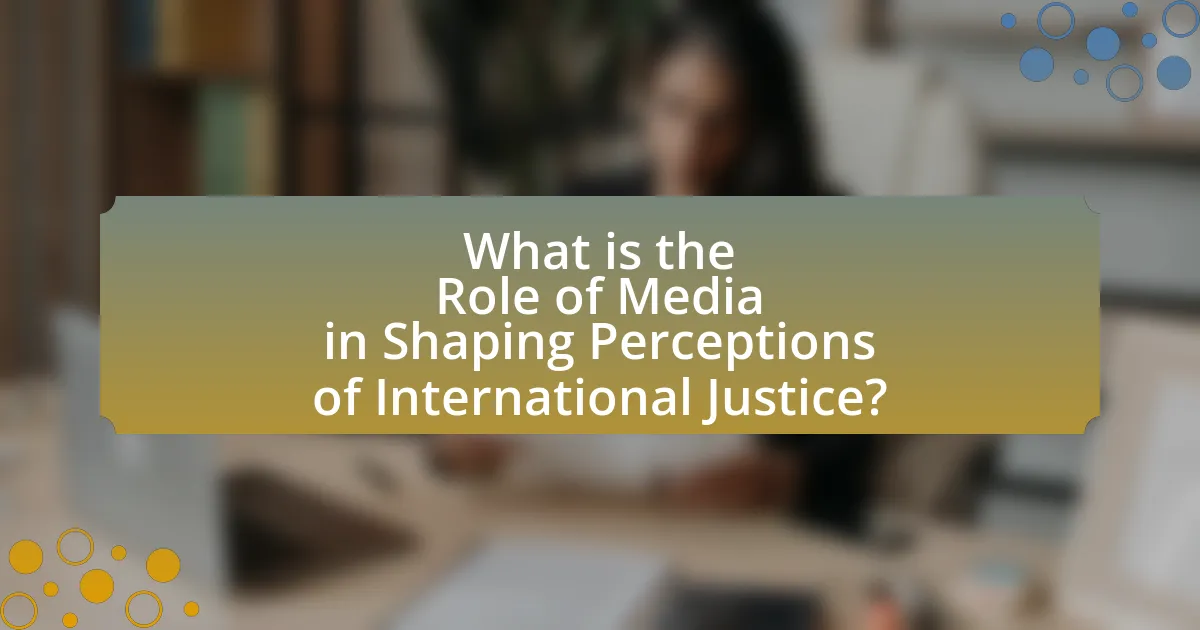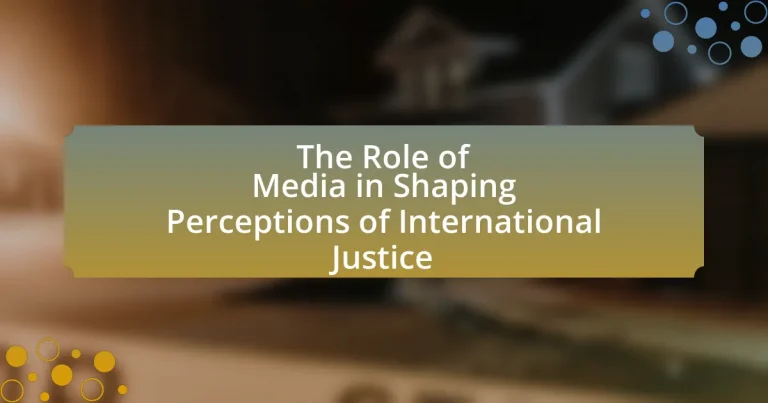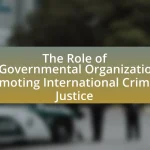The article examines the critical role of media in shaping perceptions of international justice, highlighting how various media platforms influence public opinion and frame narratives around justice-related issues. It discusses the impact of media coverage on awareness and advocacy for international justice, particularly in cases of human rights violations and war crimes. The article also addresses challenges faced by media, such as bias and misinformation, and emphasizes the importance of accurate representation in fostering informed public discourse. Additionally, it outlines practical steps individuals can take to critically engage with media representations of international justice, ultimately underscoring the media’s significant influence on policy-making and societal attitudes towards justice initiatives.

What is the Role of Media in Shaping Perceptions of International Justice?
The media plays a crucial role in shaping perceptions of international justice by influencing public opinion and framing narratives around justice-related issues. Through news coverage, documentaries, and social media, the media highlights specific cases, often emphasizing human rights violations and the need for accountability, which can mobilize public support for international justice initiatives. For instance, the extensive media coverage of the International Criminal Court’s prosecution of war crimes in the former Yugoslavia helped raise awareness and fostered a global dialogue about accountability and justice. This demonstrates how media not only informs but also shapes the collective understanding and expectations of international justice mechanisms.
How does media influence public understanding of international justice?
Media significantly influences public understanding of international justice by shaping narratives, framing issues, and providing information that informs public opinion. Through news coverage, documentaries, and social media, media outlets highlight specific cases of international justice, such as war crimes or human rights violations, which can lead to increased awareness and advocacy. For instance, the extensive media coverage of the International Criminal Court’s prosecution of individuals for genocide has raised public consciousness about accountability for atrocities. Studies, such as those conducted by the Pew Research Center, indicate that media portrayal can affect public perceptions of the legitimacy and effectiveness of international justice mechanisms, often swaying public support or opposition based on the framing of these issues.
What are the key media platforms involved in this influence?
The key media platforms involved in influencing perceptions of international justice include social media, traditional news outlets, and online streaming services. Social media platforms like Twitter and Facebook facilitate real-time discussions and dissemination of information, shaping public opinion rapidly. Traditional news outlets, such as CNN and BBC, provide in-depth reporting and analysis, which can frame narratives around international justice issues. Online streaming services, like YouTube and Netflix, offer documentaries and films that can humanize complex legal matters and bring attention to specific cases, thereby influencing audience perceptions. These platforms collectively play a significant role in shaping how international justice is perceived globally.
How do different media formats affect perceptions of international justice?
Different media formats significantly influence perceptions of international justice by shaping narratives, accessibility, and emotional engagement. For instance, visual media such as documentaries and news broadcasts can evoke strong emotional responses, making complex issues more relatable and urgent, as evidenced by the impact of films like “The Act of Killing,” which brought attention to human rights abuses in Indonesia. In contrast, written formats like academic articles or reports often provide in-depth analysis but may lack the immediate emotional impact, potentially leading to a more detached understanding of justice issues. Research by the Pew Research Center indicates that individuals exposed to multimedia content are more likely to engage with and share information about international justice, highlighting the role of social media in amplifying these narratives. Thus, the format of media not only affects how information is consumed but also shapes public opinion and advocacy surrounding international justice.
Why is media representation important in the context of international justice?
Media representation is crucial in the context of international justice because it shapes public perception and influences policy decisions. Accurate and fair media portrayals can raise awareness about injustices, mobilize public opinion, and hold authorities accountable. For instance, coverage of war crimes and human rights violations can lead to international pressure for legal action, as seen in the case of the International Criminal Court’s prosecution of individuals for genocide in Rwanda, which was significantly influenced by media reporting. Thus, the media serves as a vital conduit for information that can drive justice initiatives and promote global accountability.
What impact does media representation have on public opinion?
Media representation significantly influences public opinion by shaping perceptions, attitudes, and beliefs about various issues. Research indicates that media portrayals can create stereotypes, frame narratives, and highlight specific aspects of events, which in turn affects how audiences interpret and respond to those issues. For instance, a study by the Pew Research Center found that individuals exposed to diverse media representations of international justice issues were more likely to develop empathetic views and support for humanitarian interventions. This demonstrates that the way media presents information can directly impact public sentiment and policy preferences regarding international justice.
How does media framing shape narratives around international justice cases?
Media framing significantly shapes narratives around international justice cases by influencing public perception and understanding of these events. The way media presents information—through selective emphasis, language choices, and contextualization—can alter the audience’s interpretation of justice processes and outcomes. For instance, framing a trial as a “victory for human rights” versus a “political maneuver” can lead to vastly different public reactions and support levels. Research indicates that media coverage focusing on emotional aspects, such as victim stories, tends to garner more public empathy and engagement, thereby affecting the perceived legitimacy of international justice efforts. Studies, such as those by Entman (1993) on framing effects, demonstrate that the framing of news can shape not only individual opinions but also broader societal narratives regarding justice and accountability.
What challenges does media face in reporting on international justice?
Media faces significant challenges in reporting on international justice, primarily due to issues of access, complexity, and bias. Access to information can be restricted in conflict zones or authoritarian regimes, limiting journalists’ ability to gather accurate data. The complexity of international legal frameworks and proceedings often makes it difficult for media to convey clear narratives, leading to misunderstandings among audiences. Additionally, media bias can arise from political affiliations or cultural perspectives, which may skew the portrayal of justice processes. These challenges hinder the media’s role in shaping informed public perceptions of international justice.
How do biases in media coverage affect perceptions of justice?
Biases in media coverage significantly distort perceptions of justice by shaping public narratives and influencing societal attitudes toward legal outcomes. For instance, when media outlets emphasize certain aspects of a case, such as the race or socioeconomic status of individuals involved, they can create stereotypes that affect how justice is perceived. Research by the American Psychological Association indicates that biased media portrayals can lead to misinformed public opinions, where individuals may believe that certain groups are more prone to criminal behavior, thus skewing their understanding of justice. Furthermore, studies show that sensationalized reporting can lead to a public outcry for harsher penalties, which may not align with fair legal practices, ultimately affecting the judicial process and its perceived legitimacy.
What role does misinformation play in shaping public perceptions?
Misinformation significantly distorts public perceptions by creating false narratives and influencing beliefs. Studies show that exposure to misinformation can lead to the formation of incorrect opinions, as individuals often rely on misleading information to shape their understanding of complex issues. For instance, research published in the journal “Science” found that people are more likely to believe false information when it aligns with their pre-existing beliefs, demonstrating how misinformation can reinforce biases and alter perceptions of reality. This manipulation of information can undermine trust in legitimate sources and skew public discourse, particularly in the context of international justice, where accurate information is crucial for informed opinions and decision-making.
How can media improve its role in shaping perceptions of international justice?
Media can improve its role in shaping perceptions of international justice by providing accurate, balanced, and comprehensive coverage of international legal proceedings and human rights issues. By prioritizing fact-based reporting, media can counter misinformation and highlight the complexities of international justice, such as the challenges faced by international courts and the importance of accountability for war crimes. For instance, the International Criminal Court’s efforts to prosecute individuals for genocide and crimes against humanity can be better understood through in-depth analysis and contextual reporting, which helps audiences grasp the significance of these legal actions. Furthermore, media can engage with diverse voices, including victims and legal experts, to present a multifaceted view of justice, thereby fostering a more informed public discourse.
What best practices should media organizations adopt for accurate reporting?
Media organizations should adopt rigorous fact-checking protocols to ensure accurate reporting. Implementing a systematic approach to verify information before publication helps prevent the dissemination of false narratives. For instance, the Poynter Institute emphasizes the importance of cross-referencing multiple credible sources to confirm facts, which significantly reduces the likelihood of inaccuracies. Additionally, training journalists in ethical reporting standards, as outlined by the Society of Professional Journalists, fosters accountability and transparency in news coverage. By adhering to these best practices, media organizations can enhance their credibility and contribute positively to public understanding of international justice issues.
How can media engage audiences to foster a better understanding of international justice?
Media can engage audiences to foster a better understanding of international justice by providing accessible and informative content that highlights key issues, cases, and principles related to justice on a global scale. For instance, documentaries and investigative journalism can illustrate the complexities of international law and human rights violations, making these topics relatable and comprehensible to the general public. Research indicates that visual storytelling, such as through documentaries, can significantly enhance audience engagement and retention of information, as seen in the success of films like “The Act of Killing,” which brought attention to the Indonesian mass killings and their implications for justice. Furthermore, interactive platforms, such as social media, allow for real-time discussions and dissemination of information, enabling audiences to engage with experts and activists, thereby deepening their understanding of international justice issues.
What are the implications of media’s role in shaping perceptions of international justice?
Media significantly influences perceptions of international justice by framing narratives that shape public understanding and opinion. This framing can lead to heightened awareness of injustices, as seen in coverage of war crimes or human rights violations, which can mobilize public support for international legal actions. Conversely, media can also perpetuate biases or misinformation, impacting the legitimacy of international justice mechanisms. For instance, selective reporting on certain cases can skew public perception, leading to a lack of trust in institutions like the International Criminal Court. Studies have shown that media portrayal affects public attitudes towards justice initiatives, highlighting the critical role of responsible journalism in fostering informed discourse on international justice.
How does media influence policy-making in international justice?
Media influences policy-making in international justice by shaping public opinion and framing narratives around justice issues. Through coverage of human rights violations, war crimes, and international legal proceedings, media outlets can mobilize public sentiment, prompting governments and international organizations to respond. For instance, the extensive media coverage of the Rwandan Genocide in 1994 led to increased international awareness and subsequent policy actions, including the establishment of the International Criminal Tribunal for Rwanda. Additionally, social media platforms amplify grassroots movements, allowing citizens to advocate for justice reforms and hold policymakers accountable, as seen in the global response to the Black Lives Matter movement, which has influenced discussions on police reform and international human rights standards.
What are the long-term effects of media narratives on international justice perceptions?
Media narratives significantly shape long-term perceptions of international justice by influencing public opinion, framing issues, and establishing norms. For instance, consistent media coverage of international tribunals and human rights violations can lead to increased awareness and support for justice initiatives, as evidenced by the global response to the International Criminal Court’s actions in cases like the Darfur conflict. Furthermore, media narratives can create a sense of legitimacy or illegitimacy around international justice mechanisms, impacting how societies view their effectiveness and fairness. Research by the Pew Research Center indicates that media portrayal of international justice can lead to shifts in public attitudes, with 70% of respondents in a study expressing that media coverage affects their understanding of global justice issues. Thus, the long-term effects of media narratives are profound, shaping not only individual perceptions but also collective societal attitudes towards international justice.
What practical steps can individuals take to critically engage with media representations of international justice?
Individuals can critically engage with media representations of international justice by actively analyzing the sources, context, and framing of the information presented. This involves evaluating the credibility of the media outlet, considering the potential biases in reporting, and recognizing the language used to describe events and actors involved in international justice issues. For instance, research by the Pew Research Center indicates that media framing can significantly influence public perception, highlighting the importance of discerning how narratives are constructed. Additionally, individuals should seek diverse perspectives by consulting multiple sources, including academic articles and reports from reputable organizations like Human Rights Watch or Amnesty International, to gain a more comprehensive understanding of international justice topics. Engaging in discussions and forums can also enhance critical thinking and awareness of different viewpoints, further enriching one’s analysis of media representations.


